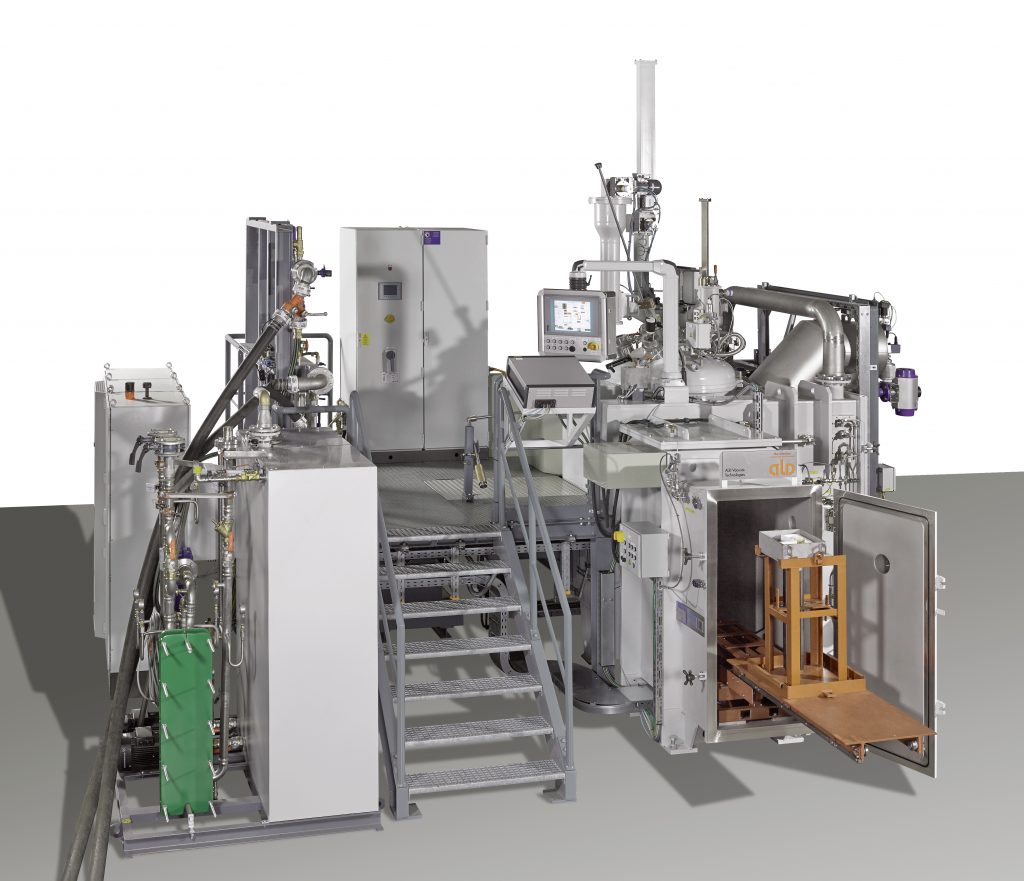VIM 02 -100
Vacuum Induction Melting & Casting Systems for Charge Weights from 1 up to 750 kg for R&D and Pilot-Scale Production
ALD Vacuum Technology GmbH designs, engineers and manufactures a variety of small vacuum induction melting & casting systems used to produce high-quality metal alloys for R&D and pilot scale production. ALD has extensive experience in combining various melting technologies with casting systems to address specific material requirements and to produce alloys with different geometries. ALD’s history as a VIM technology leader includes experience in delivering small scale VIM systems to leading R&D institutes and specialty metal alloy producers throughout the world.
The application-specific combination of melting sub-systems combined with different casting techniques enables production of a wide range of super-clean metal alloys, including super-alloys, precious metals, refractory and reactive metal alloys. Our clients can choose between small VIM systems with charge weights from 1 kg up to 750 kg. ALD can customize systems using its library of design variations to meet customer requirements.

VIM12-HMC system (VIM with 12 liter melt volume and Horizontal Mold Chamber)
Vacuum induction melting and casting is the most commonly used process in secondary metallurgy to melt solid metal feedstock, to refine the metals while in the liquid state and to adjust the chemical composition. Melting and casting in vacuum or controlled inert gas atmosphere is often required for the production of a variety of high-performance metal alloys and is essential for quality manufacturing of Ni-based super-alloys as well as Fe-, Co-, Cr-based and other special alloys.
The advantages of VIM include precise modification and control of the alloy composition while in a controlled atmosphere. Subsequent casting of the molten metal again under vacuum or controlled inert gas atmosphere in partly pre-heated molds or using other casting technologies such as continuous casting minimizes surface oxidation of the cast metal and can improve material properties.
In a VIM + Casting system, the starting materials are melted using electromagnetic induction by coupling electrical power into the crucible / material under controlled atmosphere. Once the desired melt homogeneity and chemical composition have been achieved, the material is poured into molds to create metal bar-sticks, electrodes, flakes, wires, foils or bands depending on the user requirement. ALD offers a broad range of VIM system sizes and designs using different casting technologies to meet each customer’s individual requirements.
System Sizes and Design Variations
ALD manufactures single-chamber VIM systems which share a melting and casting chamber and dual-chamber systems with separate melting and casting chambers. Small scale, single-chamber VIMs are equipped with a single vacuum chamber, induction coil, vacuum pump set, melt power supply, controls and accessories.
Dual-chamber VIM systems with separate melting and casting chambers are arranged either vertically or horizontally. An isolation valve is optional for dual-chamber systems, allowing loading the molds shortly before casting. This minimizes heat loss during melting and reduces cycle time since melting and mold removal are parallel steps.
Materials, Material Characteristics and Applications
Small VIM systems are most commonly used for melting and processing a variety of metal elements and alloys and then casting the alloys into bar-sticks, electrodes, flakes, wires, foils or bands. Some of the metals and alloys used and typical applications are highlighted below:
Materials
- Ni-base super-alloys
- Fe-, Co-, Cr-base alloys
- High alloy steels
- Magnetic alloys
- High purity Cu-, Al- and Mg-alloys
- Precious metals and their alloy
- Refractory metals and their alloys
Material Characteristics
- High purity
- Low O, N, and H concentrations
- Precise chemical composition
- Tight compositional tolerances
- Excellent surface quality
Applications and Markets Served
- Research and development
- Pilot-scale production
- Aviation industry
- Power engineering
- Electronics and chemical industry
- Bio-medical engineering
- Precious metal industry
Contact
Mr. Holger Liphardt,
T: + 49 6181 307 3306
E: Holger.Liphardt@ald-vt.de
Mr. Konrad Schubert
T: +49 6181 307 3349
E: Konrad.Schubert@ald-vt.de
Mr. Dr. Qiang Wu
T: +49 6181 307 3315
E: Dr.Qiang.Wu@ald-vt.de

